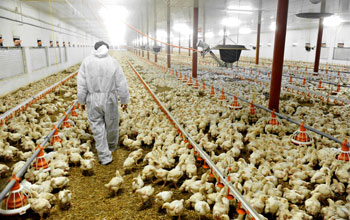OIE: HPAI spreading; other diseases remain problems

Highly pathogenic avian influenza is a rising global concern, spreading more quickly since early 2017.
Peste des petits ruminants outbreaks also have occurred in new countries, despite a project to eradicate the disease by 2030, according to a report published in May by the World Organisation for Animal Health (OIE). Tuberculosis in cattle and rabies also remain problems, despite campaigns to eliminate the global TB epidemic and end dog-transmitted rabies infections in humans, also by 2030.
Lumpy skin disease of cattle is spreading to new countries, expanding into Europe from its usual range in Africa and the Middle East.
The report in May on the state of global animal health describes a global HPAI epizootic that has spread to 40 percent of the OIE's 181-member countries since 2006.
The most recent confirmed outbreak of highly pathogenic avian influenza in the United States occurred in March 2017, when an H7N9 virus was found in a 74,000-chicken flock in Tennessee, according to information from the OIE and U.S. Department of Agriculture. The flock was depopulated.
Canadian officials last reported finding HPAI among commercial animals in 2015, when an H5N2 outbreak occurred in turkeys, OIE information states. Mexican authorities reported finding an H7N3 strain on a chicken farm in February 2018.
Bovine tuberculosis, a zoonotic disease caused by Mycobacterium bovis, causes illnesses in people and livestock in areas throughout the world, OIE information states. Bovine TB has been all-but-eliminated from livestock populations in the U.S., where only sporadic infections are found, APHIS information states.
The report also notes that the OIE, World Health Organization, Food and Agriculture Organization of the United Nations, and Global Alliance for Rabies Control are working together on a campaign to prevent human deaths from rabies. About 59,000 people die from rabies infections each year, 95 percent of them in Africa and Asia and most resulting from dog bites, according to GARC.
The OIE published the report during the 86th General Session of the World Organisation for Animal Health, May 20-25 in Paris.
Related JAVMA content:
Eradicating goat plague (Nov. 1, 2015)
Eliminating dog-transmitted rabies (Dec. 15, 2013)